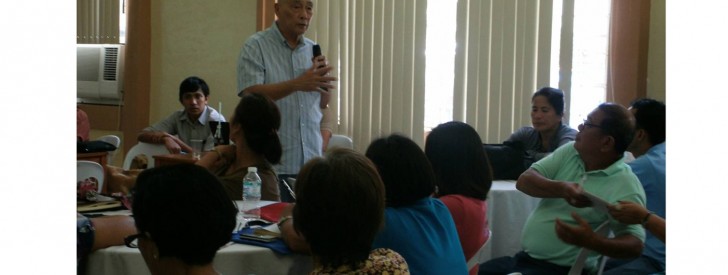 Sorsogon Governor Raul R. Lee expresses support to the development of the province’s pili industry through the PRDP during the PCIP stakeholders’ consultation held at the Training Hall of the Capitol Building in Sorsogon City. He encourages the participants to actively contribute in the completion of data required by the project.
Sorsogon Governor Raul R. Lee expresses support to the development of the province’s pili industry through the PRDP during the PCIP stakeholders’ consultation held at the Training Hall of the Capitol Building in Sorsogon City. He encourages the participants to actively contribute in the completion of data required by the project. PCIP stakeholders’ consultation held to boost Sorsogon’s pili industry
November 14, 2014
SORSOGON CITY —Bicol is known as a top source of coconut, the tree of life. But did you know that pili, the tree of hope, is also abundant in the region? Canarium ovatum, better known as pili, is a fruit-bearing tree endemic in the Philippines particularly in the sandy loam and volcanic soils of the Province of Sorsogon, with 1,373 hectares planted to pili and 102,983 pili-bearing trees as of 2012.
Pili is one of the country’s valuable commodities due to its commercial, environmental, industrial and nutritional benefits from its roots to its fruit pulp. The fruit-bearing tree yields three product forms: fresh pili or “lantahon,” dried shelled pili or “lagting,” and kernel or “ilog.” According to the Bureau of Agricultural Statistics’ (BAS) Updated Average Production Costs and Returns, in 2013, pili nut incurred an average gross return of P117,628 per hectare.
Thus, with a vision of becoming a globally progressive and competitive primary exporter of pili that significantly contributes to economic development of Bicol Region, the Provincial Project Management and Implementation Unit (PPMIU) of Sorsogon is working double time for the approval of the Provincial Commodity Investment Plan (PCIP), with pili as priority commodity.
On November 12, 2014, the PPMIU and the Regional Program Coordination Office (RPCO) Region 5 conducted a PCIP stakeholders’ consultation at the Training Hall of the Capitol Building in Sorsogon City. This was attended by key players in the province’s pili industry including municipal agricultural officers (MAO) from various municipalities, producers, traders, support service providers, input dealers as well as representatives from partner government agencies.
Issues and concerns with regard to the existing situation and opportunities of the pili industry were discussed including low yield due to non-adoption of recommended farm management practices and technologies, unavailability of proper storage facility and dryer, and lack of collaboration and cooperation among farmers.
The participants agreed to propose the conduct of training on Good Marketing Practices (GMP) among processors, creation of a Provincial Pili Board and federation of Pili-based organizations, and price monitoring or conduct of business or farmers’ forum on pili. Propagation of registered pili, accreditation of private nursery operations, and utilization of 104,062 hectares idle lands available for planting pili were also suggested.
During the open forum, Governor Raul R. Lee encouraged the participants to contribute to the completion of data required by the Philippine Rural Development Project (PRDP). He expressed support to the development of the pili industry by allotting a portion of the province’s savings to PRDP.
PRDP Program Coordinator Dominador O. Jardin said that the PPMIU of Sorsogon will work hard to submit the PRDP documentary requirements on or before December 30, 2014 to be included in the 2015 budget.
“Through the stakeholders’ consultation, at least through the help of Department of Agriculture Region 5, nalaman namin ang mga pagkukulang and we will use these as stepping stones,” he stated.
Sorsogon’s PCIP aims to boost pili production to 400 metric tons per year from 200 metric tons in 2012 by addressing the needs for a value adding enterprise, pili nursery accreditation and seedling certification, establishment of post-harvest facilities, and construction of farm-to-market roads (FMRs) to pili production areas. On August 20, 2014, the Regional Program Advisory Board (RPAB) approved the province’s 20-million-worth Investments for Rural Enterprises and Agricultural and Fisheries Productivity (I-REAP) business plan for Pili Integrated Enterprise with the Pili Processors Association of Sorsogon Inc. as proponent group. (Annielyn L. Baleza, I-SUPPORT InfoACE Unit, DA-RAFID 5)
